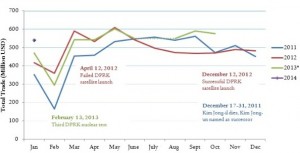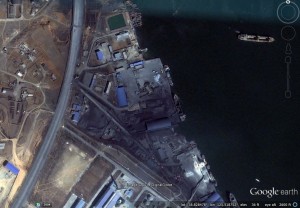Here is the official statement published by KCNA (and KCNA Watch):
Substance of Agreement at DPRK-Japan Inter-Governmental Talks
Pyongyang, May 30 (KCNA) — Substance of the agreement reached at the DPRK-Japan inter-governmental talks held in Stockholm, Sweden on May 26-28, 2014 is as follows:
Both sides had an in-depth discussion on the issues of settling the inglorious past, settling pending issues and normalizing the bilateral relations according to the DPRK-Japan Pyongyang Declaration.
The Japanese side requested the DPRK side to conduct a survey of all Japanese including the remains and graves of the Japanese who died in the territory of the DPRK before and after the year 1945 and the remaining Japanese, Japanese spouses, victims of abduction and missing Japanese.
The DPRK side appreciated the Japanese side’s recognition of the efforts made by the DPRK to settle the abduction issue in the past and expressed the willingness to conduct a comprehensive and full-scale survey for all the Japanese for the final settlement of all issues related to Japanese though there is its previous stand.
According to this, the Japanese side voiced its intent to finally lift the measures against the DPRK (sanctions) which it is slapping on its own at present. (The measures taken as regards resolutions of the UNSC are not included.)
The action measures to be taken by both sides are as follows:
Both sides decided to implement the following specific measures at an early date and have a close consultation to do so:
-Japanese side
First, the Japanese side re-clarified its will to settle its inglorious past, solve the pending issues and normalize the relations together with the DPRK side according to the DPRK-Japan Pyongyang Declaration and agreed to take a sincere approach towards building confidence between the two countries and settling issues of improving the bilateral relations.
Second, it agreed to lift restrictions on visits of persons, special measure of restrictions taken against the DPRK regarding money remittance and money carried by visitors and the embargo on the entry of the DPRK-flagged ships with a humanitarian mission into the Japanese ports once the DPRK side sets up a “special investigation committee” for the comprehensive survey and starts it.
Third, it highly appreciated the cooperation rendered by the DPRK side in realizing the visits to ancestral graves in the DPRK by bereaved families of Japan as regards the issue of the remains of Japanese and agreed to take necessary measures, furthering the consultation with the DPRK side in connection with the handling of the remains of Japanese and their graves left uncared in the territory of the DPRK and the visits to the ancestral graves.
Fourth, the Japanese side agreed to continue the survey of the Koreans who went missing in the past as requested by the DPRK side and take relevant steps through discussion with the DPRK side.
Fifth, it agreed to have a sincere discussion on the issue of the status of the Koreans in Japan according to the DPRK-Japan Pyongyang Declaration.
Sixth, in order to confirm issues arising in the comprehensive and full-scale survey, it agreed to take appropriate measures including the meeting with personnel concerned from the Japanese side and sharing of relevant information about the issues, raised by the DPRK side.
Seventh, it agreed to examine humanitarian aid to the DPRK at an appropriate time from a humanitarian stand.
-DPRK side
First, the DPRK side agreed to conduct a comprehensive and full-scale survey of all Japanese including the remains and graves of those who died in the territory of the DPRK before and after the year 1945, remaining Japanese, Japanese spouses, victims of abduction and missing Japanese.
Second, it agreed to conduct a simultaneous survey of all matters raised, not just giving priority to some of them.
Third, it agreed to set up the “special investigation committee” invested with special mandate (mandate to survey all organs) with a view to conducting specific and in-depth survey of all matters.
Fourth, it agreed to inform the Japanese side of the survey and confirmation of Japanese when necessary including the issues of the remains of Japanese and their graves, remaining Japanese and Japanese spouses. It agreed to have an appropriate discussion with the Japanese side on the issue of handling the remains unearthed in the course of work and the issue of course of action concerning the survivors including their repatriation.
Fifth, as for the abduction issue it agreed to inform the Japanese side of the survey of the abductees and missing Japanese when necessary. When survivors are found in the course of survey, it agreed to inform the Japanese side of it and discuss the issue of the course of action and take measures in the direction of sending them back to Japan.
Sixth, in order to ensure the confirmation of the issues raised by the Japanese side as the survey progresses, it agreed to take appropriate measures for stay in the DPRK of the Japanese personnel concerned and meet with persons concerned and visits to the places concerned while sharing relevant information with the Japanese side.
Seventh, it agreed to make a prompt survey, further consultation of issues arising in this course in various forms and methods and take appropriate measures.
Unverified reports claim there are some minor discrepancies between the Japanese and Korean understandings of the statements. Reportedly the Japanese side has agreed to remove the restrictions at a point of time when the “special investigation committee” has been established and investigations have been initiated, not simply when a committee was established. Secondly the Mangyongbong-92 will remain unauthorized to enter Japan. Finally, the Japanese will do nothing to intervene in the sale of the Chongryun (Shosen Soren) headquarters.
Here is additional coverage:
1. 38 North
2. Yonhap
3. The Diplomat
6. Japan Times
7. NK News


